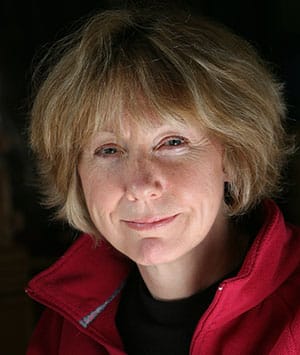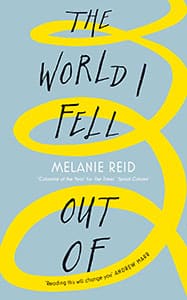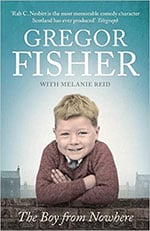Melanie Reid
Melanie Reid is a writer and columnist at The Times. Since 2010, when she fell off her horse and broke her neck, she has written Spinal Column in The Times Saturday Magazine. She has held senior positions at the Scotsman, Sunday Mail and the Herald.
Melanie is represented at Jenny Brown Associates by Jenny. For all enquiries contact jenny@jennybrownassociates.com

Books by Melanie

The World I Fell Out Of
Fourth Estate, March 2019
Winner of Saltire Scottish Non Fiction Book of the Year
From the award-winning writer of The Times Magazine‘s ‘Spinal Column’: a deeply moving and often darkly funny memoir about disaster and triumph. Foreword by Andrew Marr.
On Good Friday, 2010 Melanie Reid fell from her horse, breaking her neck and fracturing her lower back. She was 52. Paralysed from the top of her chest down, she was to spend almost a full year in hospital, determinedly working towards gaining as much movement in her limbs as possible, and learning to navigate her way through a world that had previously been invisible to her. As a journalist Melanie had always turned to words and now, on a spinal ward peopled by an extraordinary array of individuals who were similarly at sea, she decided that writing would be her life-line. The World I Fell Out Of is an account of that year, and of those that followed. It is the untold ‘back story’ behind Melanie’s award-winning ‘Spinal Column’ in The Times Magazine and a testament to ‘the art of getting on with it’.
Unflinchingly honest and beautifully observed, this is a memoir about the joy – and the risks – of riding horses, the complicated nature of heroism, the bonds of family and the comfort of strangers. Above all, The World I Fell Out Of is a reminder that at any moment the life we know can be turned upside down – and a plea to start appreciating what we have while we have it.
‘Searingly honest and frank … A very personal tale that makes you laugh and cry … captivating’ Telegraph
‘She is perceptive ― and lacerating ― about the pressures felt by disabled people to be cured … Above all, the book is a plea to those still living with well-functioning bodies to be aware of what they have. To love themselves and relish their ability to dance, run, go to the lavatory without help. With serious disability can come wisdom and perspective, and Reid passionately urges fellow women to set aside their self-loathing and “get out there and live”’ Sunday Times
‘This is an astonishing and riveting book … It is horrifying, certainly, frightening in as much as it shows how we are all skating, as it were, on the thinnest of ice which may break at any moment, plunging us into the darkest and coldest of deep waters; but also encouraging because it is a testimony to the resilience of the human spirit – as well as to the care and expertise of our health service.’ Alan Massie, Scotsman
‘Reid reveals with insight, candour and courage what it’s like to find yourself suddenly inhabiting a world that was previously unknown to you … a powerful, life-affirming memoir.’ Observer
‘Reid’s writing is excellent, beautifully paced and sometimes shockingly truthful. And my God, this woman is brave, not only for revealing all the gory details, but for questioning those tiresome platitudes about positivity. … Not a breath of fresh air, more of a hurricane.’ Kate Saunders, The Times

